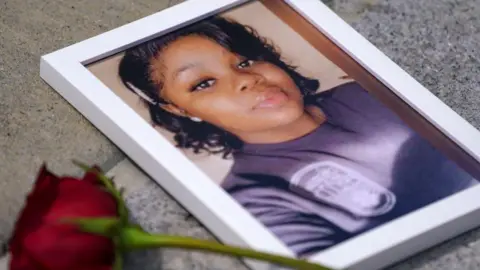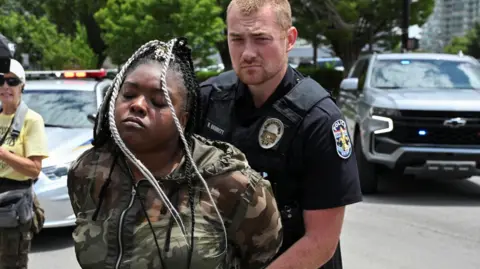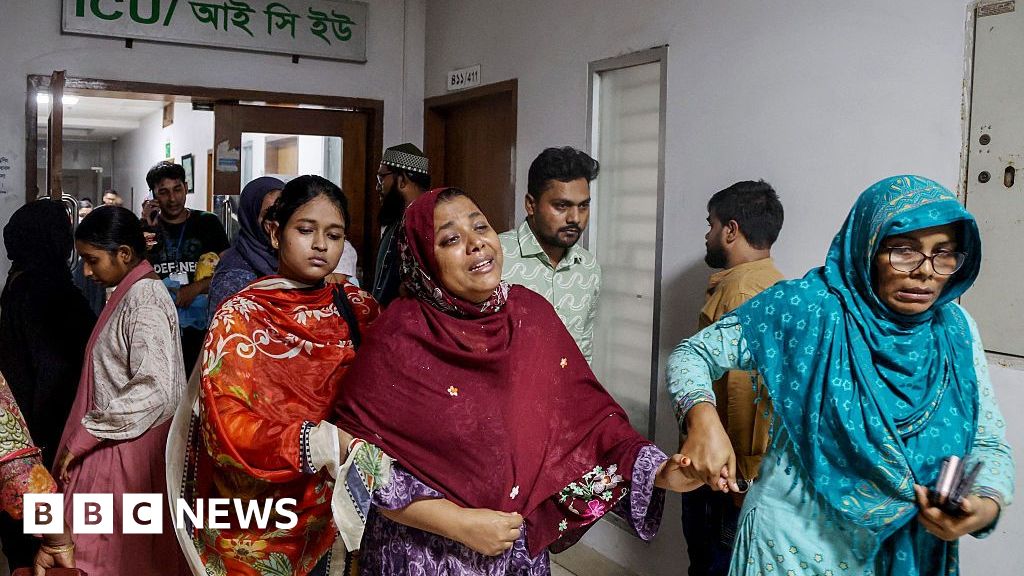
 Getty Images
Getty Images
A former Kentucky police officer has been sentenced to 33 months in prison after being convicted in connection with a raid that resulted in the fatal shooting of Breonna Taylor, a black woman, in her home.
A federal jury last year found Brett Hankison guilty of violating Taylor's civil rights by using excessive force. The maximum sentence for the charge was life in prison.
The sentencing comes days after the Trump administration asked the judge to give Hankison a one-day sentence - a position that starkly contrasts with the approach to the case under President Joe Biden.
Hankison is the only officer who has been charged and convicted directly in connection with the botched raid.
Another former officer, Kelly Goodlett, who pleaded guilty to conspiring with a colleague to falsify the affidavit used to obtain search warrant for Taylor's home and to cover up their actions after her death, will be sentenced next year.
After his sentence, Hankison will face three years of supervised release.
Tamika Palmer, Taylor's mother, and lawyers for the family spoke after the sentencing on Monday.
"I think the judge did the best she could with what she had to work with," Ms Palmer said, but she was critical of federal prosecutors who had argued for a lesser sentence.
Taylor's boyfriend Kenneth Walker, who was in the apartment with her the night of the raid, said he was "grateful for the small piece of justice that we got".
Taylor became a face of the Black Lives Matter movement in 2020 following her death and the police killing of George Floyd, who was murdered during a police arrest that same year.
She was killed after officers in plain clothes executed a "no-knock" search warrant at her home. They burst into her apartment in the early morning hours while she and Walker, were asleep.
Authorities believed Taylor's former boyfriend was using her home to hide narcotics.
Mr Walker fired a single shot when the police knocked the door down, hitting one officer, Sgt John Mattingly, in the leg. Mr Walker said the officers did not announce themselves as police, and he thought they were intruders.
The three officers returned fire, shooting 32 bullets into the flat.
Hankinson fired 10 times into her apartment, in order, he said during the trial, to protect fellow officers.
None of Hankison's bullets hit anyone, but they did enter a neighbouring property, where a pregnant woman, a five-year-old and a man had been sleeping.
Prosecutors said Hankison acted recklessly and "violated one of the most fundamental rules of deadly force: If they cannot see the person they're shooting at, they cannot pull the trigger."
Outside the courthouse, protestors waiting for the verdict blocked the streets chanting Taylor's name. Several people, including Taylor's aunt, Bianca Austin, were detained by police.

 Reuters
Reuters
Bianca Austin, Breonna Taylor's aunt, is arrested outside the courthouse while protesting
How was the justice department involved in this case?
In early November 2024, Hankison was convicted on one count of civil rights abuse.
"His use of deadly force was unlawful and put Ms Taylor in harm's way," then Attorney General Merrick Garland, a Biden-appointee, said in a statement. "This verdict is an important step toward accountability for the violation of Breonna Taylor's civil rights, but justice for the loss of Ms Taylor is a task that exceeds human capacity."
Days after Hankinson's conviction, Donald Trump won re-election - a political shift that meant the sentencing recommendation would come not from the Biden administration, which brought the charges, but from the Trump-led justice department.
Last week, that recommendation - a request for Hankison to serve one day in prison - stunned some, including Breonna Taylor's family.
"Every American who believes in equal justice under the law should be outraged," attorneys for the family said. "Recommending just one day in prison sends the unmistakable message that white officers can violate the civil rights of Black Americans with near-total impunity."
In its sentencing request, the justice department argued that although Hankison was involved in "executing the warrant" during the deadly raid, he did not shoot Taylor "and is not otherwise responsible for her death".
The justice department also said that additional prison time "would simply be unjust under these circumstances".
Ordinarily, sentencing recommendations are signed by lawyers involved in the case or career justice department employees who deal with sentencing requests.
In this case, Trump's appointee to run the Civil Rights Department, Harmeet Dhillon, signed the recommendation.
What changes has Trump's justice department made?
Since returning to the White House, Trump has made rolling back Biden-era policies a priority, particularly at the justice department.
In May, the justice department began the process of dismissing lawsuits brought against the Louisville and Minneapolis following controversy over high-profile police killings and brutality, including that of Taylor.
Investigations into police constitutional violations in other cities such as Memphis and Phoenix were also ended.
The justice department criticised the Biden administration for enacting "sweeping" oversight agreements "that would have imposed years of micromanagement" of local police by federal courts.
During Biden's tenure, the justice department opened civil investigations into 12 state and local law enforcement agencies.
In four of those - in Louisville, Minneapolis, Phoenix and Lexington, Mississippi - the department issued reports of systemic police misconduct.
While accountability agreements were made with some of the police departments, they were not formally enacted.
These changes have also come amid a mass exodus from the justice department.
In the Civil Rights Division alone, the division of the department that made the Hankison sentencing recommendation, about 70% of attorneys have left since Trump was inaugurated, reports say.









 English (US) ·
English (US) ·